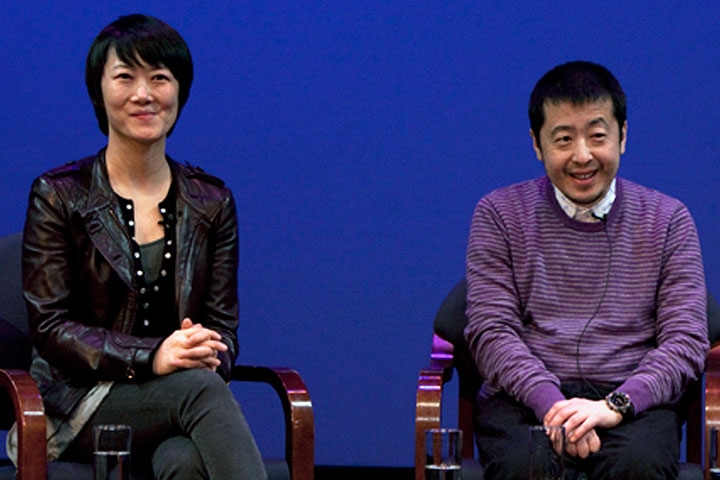Zhao Tao (born 28 January 1977) is a Chinese actress. She works in China and occasionally Europe, and has appeared in 10 films and several shorts since starting her career in 1999. She is best known for her collaborations with her husband, director Jia Zhangke, including Platform (2000) and Still Life (2006). With Shun Li and the Poet (2011), she became the first Asian actress to win a prize at David di Donatello. She received a Golden Horse Award nomination for Mountains May Depart (2015).
Biography
She was born January 28, 1977, in Taiyuan, Shanxi, which is also the hometown of the heroine in Still Life. As a child, she studied classical Chinese dance. In 1996, she enrolled in the folk dance department at Beijing Dance Academy. After graduation, she became a dance teacher in Taiyuan Normal College, where she was spotted by Jia during casting for Platform.[1] Since then they work frequently together.In 2011 she starred in the Italian film Shun Li and the Poet by Andrea Segre, which screened in the Venice Days section of the 68th Venice International Film Festival.[2] Zhao won the David di Donatello Award, the Italian Oscar, for Best Actress for her bilingual role.
the extraordinary actress Zhao Tao first appears in "Mountains May Depart," line dancing to the Pet Shop Boys' cover of "Go West," she and writer-director Jia Zhangke (her husband and longtime creative partner) set an exquisitely nuanced mood, at once buoyant and elegiac. As if to confirm the undertow of nostalgia within the pop exuberance, the date "1999" appears on-screen.
It's New Year's Eve in the Chinese city of Fenyang, and a new century is beginning. Economic reforms are kicking into high gear via wide-scale privatization. High-rises will soon tower over pagodas, and high-speed trains will leave slow models in the dust. Like most of the indispensable Jia's work, this triptych film, which jumps from 1999 to 2014 and then to 2025, is intimately engaged in the push-pull between tradition and progress.
It's also his most melodramatic feature — and, for the bulk of its running time, powerfully so. Zhao plays the spirited, compassionate Tao, who's 25 in 1999 and pursued by two men: coal miner Liangzi (Liang Jin Dong, heartbreaking) and entrepreneur Jinsheng (Zhang Yi). A hotshot with a German car, Jinsheng quickly demonstrates that his grasp of free-market opportunity extends to matters of the heart: When Tao falls for a Cantonese pop song, he rushes after the stranger playing the CD to buy it for her on the spot.
Capitalism, marriage, technology, isolation — cornerstones of modern life in the developed world — variously nurture and batter the central trio and their progeny over the story's 26-year span. With each leap in
time, Jia shifts perspective, changing the shape of the image (and incorporating his own documentary footage from the earlier periods). He begins with a square frame for the hometown romantic triangle and ends in the widescreen future world of expatriate Australia.
There, in the sunny chill of Oz, a disaffected teen (Dong Zijian) who was uprooted from China as a child and burdened with the ostensibly auspicious name Dollar, struggles to reconnect with his severed cultural identity, helped by a teacher (Sylvia Chang) who's similarly adrift.
Despite the tender moments between them, the film's third chapter goes awkwardly flat. That's partly because Jia is less assured with English dialogue and partly because the absence of Tao, a character indelibly wrought by Zhao, is so keenly felt after the potent naturalistic drama of the second section.
Sequences in which Tao helps an ill friend and deals with the death of a parent are as finely staged and acted, as sorrowful and transcendent, as anything ever to grace the screen. When she returns, in an achingly lovely coda, she restores the movie's pulse, and with it Jia's discerning vision of time's passing.










No comments:
Post a Comment